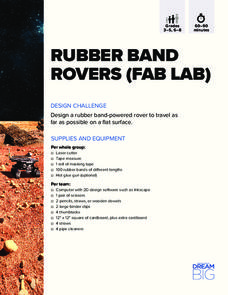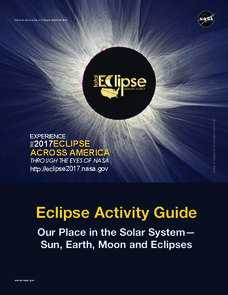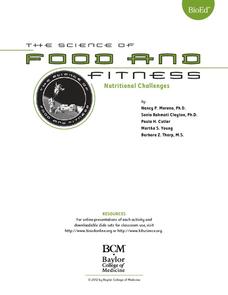Center for Math and Science Education
Solar System Launch
Trying to understand the vastness of outer space can be quite a challenge for young scientists. Help put things in perspective with this cross-curricular activity as students work in pairs creating scaled models of the solar system,...
Texas State Energy Conservation Office
Investigation: Conservation of Energy
By rolling marbles down a six-foot length of track, physical scientists determine how much energy is lost to heat. It is recommended that you opt for the foam pipe insulation track because more friction slows the marble, allowing...
Baylor College
There's Something in the Air
Clever! In order to compare indoor and outdoor dispersal rates for the movement of gases and particles through air, collaborators will participate in a classroom experiment. Set up a circular grid and set learners on lines that are...
Minnesota Literacy Council
Scientific Method
Here is a resource with a descriptive approach to explaining the scientific method. It's simple, but effective for both introduction and reinforcement of this concept.
Baylor College
Gases Matter
As a demonstration or as a hands-on activity, your class watches as the combination of vinegar and baking soda produce carbon dioxide gas. The intent of the lesson is to help youngsters understand that gases occupy space. It is included...
Mrs. Sol's Class
Solar System Project
Finish or launch your unit on the solar system with a jigsaw project covering major celestial concepts such as the Milky Way Galaxy, asteroids, meteors, comets, Earth's moon, and, of course, all the planets. Learners start by writing...
Astronomical Society of the Pacific
Toilet Paper Solar System
Can we model how large the solar system really is? Attempt an astronomical feat with a hands-on-activity that uses a roll of toilet paper. Young scientists measure the distances of the planets from the sun to create a scale model of the...
Las Cumbres Observatory
Astronaut Training: Taste
Gravity isn't the only thing astronauts lose in space. Learners investigate why astronauts complain about a loss of taste while in space in a hands-on activity. They taste test foods while limiting their other senses and rate each food...
Laboratory for Atmospheric and Space Physics
A Classroom Solar System
Create a scaled model of our solar system in your classroom! Scholars work collaboratively to build paper mache planets and hang them in their proper position to showcase each planet's location in the solar system.
DiscoverE
Rubber Band Rovers
Get your learners interested in space exploration. Groups design space rovers using design software and then build prototypes of their designs. The farther the rovers can travel, the better. The catch? The rovers must be powered by...
Wilderness Classroom
Ocean Life
Our oceans are composed of many complex relationships. Young oceanographers explore relationships between organisms, understand the world ocean's currents, and discover the effects of water pollution and how it behaves. There are three...
Lake Science Collaborative
Blood Circulation Simulation
Act out the circulation of blood in the body with an innovative activity. Kids act as either body parts or blood, and carry necessary nutrients and waste throughout different stations to represent the way that oxygen circulates.
Michigan State University
In Search of Life
Explore the habitats around you with an activity that takes kids out of the classroom to learn about the local variety of habitats and the living things that call them home. In small groups, scholars investigate their surroundings,...
NOAA
Satellite Communications
How do satellites communicate? What types of satellites orbit Earth? Discover and mimic the way satellites communicate between two points in a hands-on activity that has pupils using mirrors, flashlights, and marbles.
PBS
Kinetic Sculpture
Build a sculpture that moves on its own; no power source required! The second installment of a five-part series has individuals create a sculpture that moves with the wind. It can't topple over though, so some type of support is necessary.
Safe Drinking Water Foundation
Types of Water Pollution
In groups, young environmentalists investigate water samples that are contaminated with different types of pollutants. Each group presents their findings to the class and fills out the "Types of Pollutants Chart." This lesson is meant...
University of Wisconsin
Infiltration Test: Exploring the Flow of Water Through Soils
Soil scientists gain experience with an infiltrometer can to determine the infiltration rates at different locations on campus. If you are using the entire unit, the class has already analyzed water flow and soil types, so they should...
NASA
Eclipse Activity Guide
Ever made solar s'mores? Or recreated the solar system using peanuts? Astronomers young and old investigate all things solar using a variety of activities. Explore how the sun works, types of light it emits, and methods of charting the...
Science Matters
Oh Heron
Two teams—the environmentalists and herons—play four rounds of the game, Oh Heron. Using hand symbols to represent food, shelter, and water, players locate their match to produce more herons while those unmatched decompose.
BioEd Online
Nutritional Challenges
Eating healthy can be a challenge, especially for people with special dietary needs. After learning about standard nutritional needs for adults, learners take on the role of a dietician and work together to create a menu for one of the...
Safe Drinking Water Foundation
To Filter or Not to Filter
Drinking clean water can be taken for granted. Explore the process and high cost of filtering water with a water pollution and filtration activity. Young scientist build a filtration system to filter polluted water, examine the economics...
Science Matters
Lotusland
It's time for a field trip! Scholars take their new-found knowledge of adaptations and seed dispersal on a field trip to a local botanical garden. They gain an up-close look at how ecological interdependence works in a distinct...
Consortium for Ocean Leadership
Measure for Measure
How does your class measure up? Young scientists create a scale drawing of the JOIDES Resolution in a collaborative activity. The lesson incorporates mathematical principles with deep-sea exploration to focus on enhancing measurement...
Michigan State University
May I Take Your Order?
If you're a pest, come and get a tasty meal here! Scholars work collaboratively to construct a mini restaurant out of a shoe box and create a menu that feeds a pest their favorite food.
Other popular searches
- Space Science
- Astronomy and Space Science
- Physical Science Space
- Earth and Space Science
- Science Space Experiment
- Space Science Vocabulary
- Science Space Lessons
- Space Science Astronomy
- Science Space Race
- Star Maps Science Space
- Earth Space Science
- Science Space Station

























